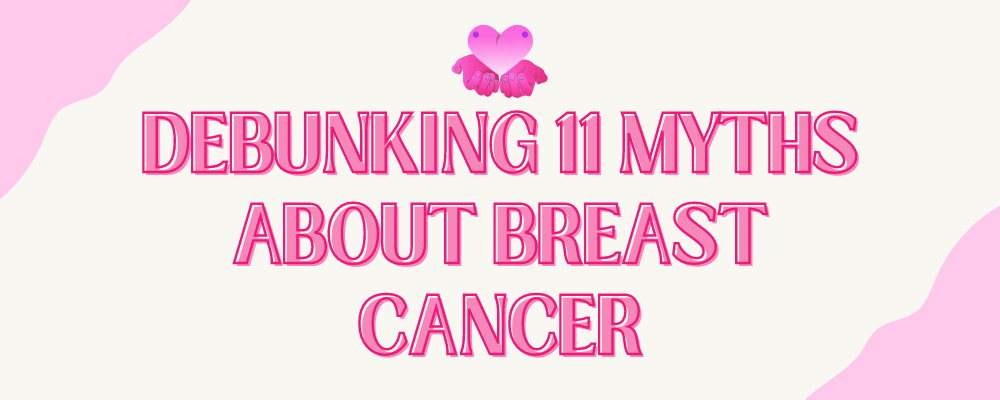Shopping Cart (0)
Your cart is currently empty.
Free shipping over $99

In order to understand what is breast cancer, we must know what is the meaning of cancer itself. Cancer is a type of disease caused by the development of abnormal cells that grows and invades other healthy cells in the body. The usual causes are when cell growth goes wrong and new cells form in places that the body doesn’t need it or when old or damaged cells don’t die as they should. Breast cancer develops in the cells around the breast then invades surrounding tissues. These abnormal cells will form a build up of cells that often forms a mass of tissues called a “lump or tumor.”
Your father’s family health history of breast cancer is just as important as your mother’s in understanding your risk.
In order to find out about the risk stemming from your father’s side, you need to look primarily at the women’s health history; while men do get breast cancer, women are more vulnerable to it.
This is false. Roughly 80% of lumps in women’s breasts are caused by benign (noncancerous) changes, cysts, or other conditions. However, doctors encourage women to report any changes because detecting breast cancer early is so beneficial.
There is no connection between breast size and your risk of getting breast cancer. However it is true that in terms of clinical examination like mammograms and MRIs, very large breast may be harder to examine than small breast.
Regardless of breast size, all women should have routine screening and checkups.
It is true that radiation is used in mammography, however, the amount is so small that the associated risks are quite low in comparison to the huge preventive benefits reaped from the test.
Roughly 70% of women diagnosed with breast cancer have no identifiable risk factors for the disease. However, If a first degree relative (such as parent, sibling or child) has had or has breast cancer the risk of getting it is higher.
This is false some women may still get breast cancer even after a mastectomy. The cancer may comeback at the same site as the scar or if the original cancer has spread. The risk is still there though small but the possibility is still there.
Women can lower their risk in developing breast cancer by making adjustment to their life style.
The following may help lower the risk:
- Losing weight and regular exercise
- Lowering alcohol consumption
- Having a well-balanced diet
- Regular clinical exams (Mammograms and MRIs)
- Regular self checking of breast
There are multiple studies that debunk this myth. There are no connections found between drinking caffeine and getting breast cancer. However, studies suggest that caffeine may actually lower the risk.
Yes, a lump or tumor may signal that you may or may not have breast cancer. However, it is best to know the signs and symptoms that breast cancer may have.
Some signs to look out for:
- Skin irritation or dimpling
- Breast or nipple pain
- Nipple retraction
- Scaliness skin around the breast
- Thickening of the nipple or breast skin
- Discharge other than breast milk
Being overweight or obese does increase the risk with breast cancer - especially if you’re past menopause.
This is absolutely false. Wearing underwire bra doesn’t compress the lymphatic system of the breast. However, wearing improper size of bra may cause the lymphatic system to not flush out toxins properly especially if the bra size is too small for you.
Breast cancer has become one of the most common cancer with women around the world. It is said that 1 out of 8 women will have breast cancer in their lifetime. It is important for everyone, not only women, to know the signs and symptoms associated to breast cancer. Knowing the risk and how to prevent them is a huge step in fighting off breast cancer.
Here are some preventive actions that may lower your risk:
People with obesity does have higher risk when it comes to breast cancer. Losing weight and maintaining a healthy weight may help lower the risk of developing breast cancer. Regular exercises and eating a well-balanced diet is important to maintain a healthy weight.
There is a breast cancer survivor diet that doctors highly recommend that can also help with prevention. This diet encourages people to add more fiber-rich food, lessen red meat or saturated fat intake and avoid low sodium and added sugars.
Many studies have proven that there is a potential link between breast cancer and excessive consumption of alcohol. Cutting or lowering your alcohol consumption may lower your risk with breast cancer
Studies have always prove that excessive smoking is not good for your health. Smoking may be linked to a variety of ailments such as lung cancer and cardiovascular diseases but it may also contribute to increasing your risk with breast cancer. Quitting will be the best for your overall health and prevention.
Studies shows that breast feeding may lower your risk in developing breast cancer. The studies suggest that the longer you breast feed the lower the risk and greater protection against the disease.
Doctors have advised women to get annual check ups especially if they have family history with breast cancer. Knowing the status of your health and the level of risk can help you know the signs and also lower the risk of developing the disease. Annual mammograms and even self-checking your breast can help you greatly.
You have no items in wishlist.
| Title |
|---|
| Price |
| Add to cart |
| Type |
| Vendor |
| Title |
|---|
| Price |
| Add to cart |
| Type |
| Vendor |
